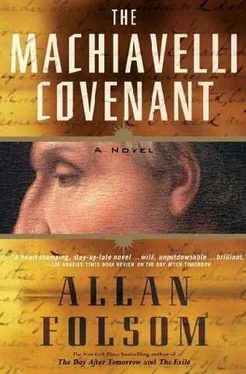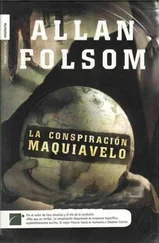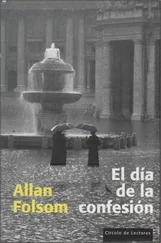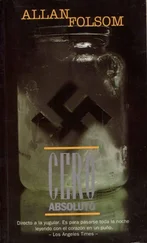"What do you mean 'then what?'" The president was staring directly at his national security adviser. "Is this a what-if, or do you have something from intelligence and this is real? Don't screw around here, Jim. If it's real I want to know. And right now."
Marshall glanced at Jake Lowe, then looked back to the president. "What it is, Mr. President, is a bona fide scenario that comes from any number of collective sources and should be taken very seriously. If it happened it would be all but impossible for us to respond quickly or massively enough to contain it. Immediate nuclear response might be our only option. One we wouldn't have time to argue through the Security Council. We would need every member already up and on the same page and moving within hours. It means we have to know beforehand that we have every member nation one hundred percent behind us. And as we well know, Germany might not be on the Security Council but from its influence, it might just as well be."
"What Jim means, Mr. President," Lowe added quietly, "is that we must have an arrangement that will guarantee America instant, ongoing, and unquestioned support in the UN. And as I said before, the way things stand now we don't have it."
President Harris looked from one man to the other. These were longtime members of his inner circle, close friends and trusted advisers, men whom he had known for years, trying to make him understand the importance and relevance of his just-concluded meetings with the leaders of France and Germany. Moreover, it wasn't just the French and Germans they would need, it was also the Russians and Chinese. They all knew that if they had France and Germany behind them, especially if the matter had to do with the Middle East, the Russians would come along as well. So would the Chinese.
"Fellas," he said, in the homey style he used in the company of friends, "the picture you draw may be accurate, and God help us if it is. But I seriously doubt the French and Germans haven't considered some version of it themselves and what they would do in response. In the same breath I can guarantee you that suddenly dropping their stance over a scenario without hard intelligence behind it and giving us a blank check overnight for whatever we want to do isn't one of them."
"That's not necessarily so," Dr. Marshall leaned back and folded his hands in his lap.
"I don't follow you."
"Suppose the leaders of those two countries were people who would give us a blank check."
The president raised his eyebrows, "What the hell does that mean?"
"You won't like it."
"Try me."
"The physical removal from office of the president of France and the chancellor of Germany."
"Physical removal?"
"Assassination, Mr. President, of both. To be replaced with leaders who we can trust, now and in the future."
Harris hesitated, then slowly grinned. It was a joke, he knew. "What do you fellas want to do, get in the video-game business? Set up a frightening situation, find the troublemakers who won't cooperate, then hit the 'assassinate' button and afterward insert whoever you want and write your own ending?"
"It's not a game, Mr. President." Marshall's eyes were locked on the president's. "I'm deadly serious. Remove Géroux and Bohlen and make certain the people we want in power are elected in their place."
"Just like that." The president was stunned.
"Yes, sir."
The president looked to Jake Lowe, "I suspect you agree."
"Yes, Mr. President, I do."
For a moment Harris stood frozen in silence as the weight of what had been presented sank in. Suddenly he flashed with anger. "I'll tell you fellas something. Nothing like that is going to happen on my watch. First, because under no circumstance will I be party to murder. Second, political assassination is forbidden by law and I am sworn to uphold the law.
"Moreover, even if you had your way and the assassinations were carried out, what would you expect to gain? Exactly which people would you want in power and how could you make certain they were elected? And even if they were, what makes you think we could trust them to do what we wanted, whenever we wanted and for as long as we wanted?"
"There are such people, Mr. President," Lowe said quietly.
"It can be done, sir," Marshall added, "and rather quickly. You'd be surprised."
Harris's eyes darted angrily from one man to the other. "Gentlemen, let me say this one more time. There will be no political assassinations on the part of the United States, not while I'm president. And if the subject comes up again you can both dig out your golf clubs and call for a tee time because you will no longer be part of this administration."
For the longest moment neither Marshall nor Lowe took his eyes from the president. Finally Marshall spoke, and in a tone that rang with condescension. "I think we understand your position, Mr. President."
"Good," Harris held their gaze, giving them no ground. "Now," he said brusquely, "if you don't mind there are a few things I'd like to go over on my own before we touch down in Rome."
• MR. HENRY'S RESTAURANT, PENNSYLVANIA AVENUE, 11:50 A.M.
Marten and Peter Fadden sat in a back booth in the dark-wood-and-authentic-retro atmosphere of this Capitol Hill saloon where the lunchtime crowd was just beginning to make noise and where decades earlier Roberta Flack was first crooning "Killing Me Softly" upstairs.
"Your friend Dan Ford was a heck of a reporter, a very special kind of guy, and-" Peter Fadden leaned in across the table when he talked. It was a manner, studied or not, that accentuated his presence. "His future was bright as hell. To be murdered the way he was? It was all wrong. Nobody should ever die like that. I still miss him."
Fadden, thickset with gray hair and a trimmed gray beard and ruddy complexion, was closer to fifty than seventy and looked even younger. A byline reporter with an old-timer's rough demeanor, he wore brown slacks with a tattersall shirt and worn herringbone jacket. His eyes were sparkling blue and piercing as he watched Marten take a sip of coffee or a bite of tuna sandwich.
"So do I, every day," Marten said genuinely. Nearly five years had passed since Ford's murder in the French countryside, and even now Marten was plagued by the thought that Dan's death was somehow his fault. There was another level too, especially now, because, as with Caroline, they'd been best friends since childhood and all those memories, all their history, compounded his death even more.
It had been Dan Ford the professional journalist with his never-ending string of connections who had made it possible for John Barron to become Nicholas Marten, thereby enabling him to make a new life in the north of England, one far from the reach of the Gunslinger, the deadly LAPD detective Gene VerMeer, and his equally vengeful associates still on the force.
"You said you had a story. What is it?" The sentiment was done. Peter Fadden took a sip of coffee.
"I said I might have a story," Marten said, then lowered his voice. "It has to do with Caroline Parsons."
"What about her?"
"What I tell you has to be off the record."
"Off the record is not a story, period," Fadden snapped. "You either have something or you don't. Otherwise we're wasting each other's time."
"Mr. Fadden, at this point I don't know if there is a story or if there isn't. I'm looking for help about something that's very personal to me. But if it turns out to be true, it's a blockbuster, in which case it's all yours."
"Oh for chrissakes!" Fadden sat back. "You want to sell me a used car too?"
"I want some help, nothing more." Marten's eyes came up to meet Fadden's and held there.
Fadden judged, then let out a sigh. "Okay, off the record. What the hell is it?"
Читать дальше












